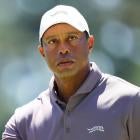
On Sunday afternoon, after shooting a 2-under 70 to finish T2 at the WGC-Workday Championship at The Concession Golf Club, four-time major winner Brooks Koepka was asked about his performance for the week. His answer was succinct and straightforward.
"I mean, I lost," Koepka said. "It doesn't matter if you finish second or in last, you didn't win."
Koepka is both wrong and right. He's wrong that it doesn't matter. In a sport where if you win three times out of 100, you're a borderline hall-of-fame player, winning cannot be the only metric used to determine goodness and badness. But he's right in that the best players in the world are measured by their wins and their losses.
This is, broadly speaking, the Tony Finau Argument. Coming into this week, Finau had finished in the top five in four straight events and won exactly none of them. In fact, he has not won an event in 60 months. And yet, he's the No. 14 player in the world because he's been performing at such a high level for such a long time. Winning cannot be the only metric we use to measure Finau's goodness, unless you're prepared to make the argument that Kevin Na and Brendon Todd are better at golf than him.
We overrate winning in golf because we're so used to it mattering so much in other sports. In a sport already bent toward sometimes-random outcomes where you also cannot play defense against your opponent, we should not only use this binary metric as a measuring stick. The more modern view of golf wins -- as one of my editors Brandon Wise pointed out -- is akin to that of pitching wins. It's an important metric that becomes a statistical inevitability at some point if you're performing well enough (it is statistically inevitable that Finau will win a golf tournament if he keeps playing like this), but it's not the only metric.
That's one side of the argument. The other side is that winning is a skill, and some golfers seem to have it in ways that others do not, which brings us to the player who actually did win the WGC-Workday Championship on Sunday, Collin Morikawa.
Since he turned pro just after the 2019 U.S. Open at Pebble Beach, Morikawa has been, statistically anyway, nearly the exact same player as Finau. Finau has been 1.55 strokes better than the field average in 159 rounds, and Morikawa has been 1.47 strokes better in 152 rounds. However, despite playing roughly the same quality of tournaments in that span of time, Morikawa has four wins, and Finau has none. Again, this is not the only thing, but it definitely matters.
Morikawa has been on the right side of the binary golf equation four times in his first 39 starts as a professional. This is a staggering winning percentage of 10.3% that only Tiger Woods has significantly surpassed over the last 30 years. Here's a look at some of the other best players in the game and what their winning percentages are as pros on the PGA Tour.
- Rory McIlroy: 9.5%
- Dustin Johnson: 8.6%
- Justin Thomas: 8.1%
- Jordan Spieth: 5.7%
Want the sharpest DFS advice, picks and data-driven golf analysis? Listen below and subscribe to The First Cut Golf podcast where we explain what's happening on the course so you can win off of it.
Of course, Morikawa's number is not likely to stay at 10.3%, but with 18 months of evidence, a major win, a WGC and a No. 4 ranking in the OWGR, this is not a statistical outlier either. The only player that can match his winning success through 40 or so events is Jon Rahm, who won four times in his first 38 events worldwide. If you throw in amateur starts, Morikawa has four wins in his 41 starts on the PGA Tour. Dustin Johnson, Rory McIlroy, Jordan Spieth and Justin Thomas had just six combined.
The two parts of the game Morikawa wields better than his contemporaries are wisdom (in the form of discipline) and maybe the best iron game since Woods. It's a lethal combination when you have a lead going into Sunday like he did over the weekend at The Concession. But you still have to close.
Golf is a game of decision-making more than anything. Some PGA Tour pros are excellent at scoring, hitting great golf shots and doing all of this with regularity and consistency. But maybe they are not as good at knowing when to pick their spots and how to wriggle into the lowest score at the right time of the week (after 72 holes). Winning is a function of timing, playing the right type of round at the right moment. Taking risks from behind, playing wisely from ahead. Morikawa seems to understand this in a way 24-year-olds should not. In a world where Finau and Morikawa have essentially been the same player for 18 straight months, there are few better explanations for why Morikawa has four wins and a major, and Finau does not.
Morikawa's trajectory is astounding. Not just because he's maybe the best iron player in the world or because Rory McIlroy said on Sunday, "it's sort of hard to think that he could hit a ball offline," but also because he clearly has accumulated the skill of winning over the course of his career. And while it's maybe unfair to disproportionately reward that skill -- above all the other skills -- with trophies, the reality Koepka noted remains. You either won, or you did not. And Morikawa has already done so a lot and will continue to for a long, long time.





















